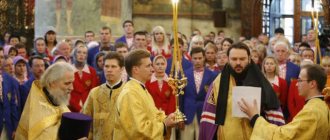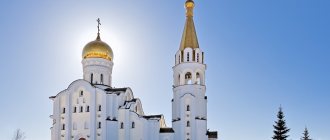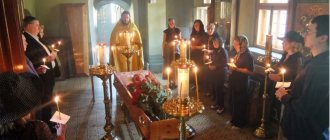Any prayer is a frank conversation with God. This method was given to people by the Almighty himself. Personal communication with the Lord helps us to know him, to realize his power and authority as the great Creator. Also, through prayer, repentance for sinful actions and pleas for forgiveness are expressed. Every believer can pray to God with a request for himself or his loved ones.
The roots of the term “prayer” go back to Proto-Slavic speech. The word “molditi” itself has been transformed in modern Russian into the word “to pray.” The earliest folk prayers were pagan and related to a wide variety of religious cults. Much attention was paid to prayers in Ancient Rome and Ancient Greece. These peoples created certain verbal formulas that were pronounced during certain religious rites. With the further development of world religions, prayers became mandatory components of religious teachings. Christian prayers can be read both in churches and at home.
Orthodoxy arose at the beginning of the 1st century and it is believed that its founder was Jesus Christ himself. In 395, as a result of the division of the Roman Empire into western and eastern, this direction was finally singled out. The theological foundations of the faith were determined in Byzantium in the 9th-11th centuries. Due to the split of Christianity into three branches, Orthodoxy emerged in 1054.
Orthodox prayers were created at different times. They were written by different people. These were the disciples of Christ, the Holy Preachers. What they have in common is that they are all based on biblical teaching. Any prayer, no matter what type it is, brings relief to the soul. It is believed that only one prayer is given to people by God. This is "Our Father". This appeal has enormous power. Believers read this prayer every day, morning and evening. In addition, you can use it to turn to God on any occasion.
In Prayers, people turn not only to God. At certain moments in life, appeals to the Mother of God, Angels and saints help. There are several types of prayers in Orthodoxy.
Dedication Prayer
The prayer of dedication is a very powerful prayer. In it, the believer confirms his will to obey God's plans. This prayer cannot be read for other people; it only confirms one’s own humility before the Almighty. It is very important to understand its essence, only in this case it will be effective, that is, it will fill a believer with strength and grace, which will help him to be successful in real life and gain victories, feeling God’s instructions. This prayer says that a person completely devotes himself to God’s plans.
An example would be the following prayer:
“Most High, Lord” I, the Servant of God (my name), completely surrender myself to You. I dedicate my soul and body, will and mind to You. I give You, Great Father, all my past, present and future, now and forever. I give you my children and family. I give you everything forever! I ask only one thing - to repent of your sins and follow the path indicated by you. I, the Servant of God (my name), love and glorify you. Fill me with the grace of God and give me strength to accept all that is given to me. Give me the opportunity to communicate with You according to Your will and help me to realize Your presence. I will always do only Your will. Show me what I must do, and I will glorify Your name. Make sure that I never neglect communication with You. Amen".
All prayers of dedication emphasize the idea that the believer commits his life to the Lord and is ready to follow all his instructions.
SECTION II. TYPES OF PRAYER
Private prayer is the kind of prayer that a believer offers to God either alone or with his family.
Division of private prayer: solitary prayer and family prayer
From the definition itself it is clear that private prayer is divided into solitary and family prayer.
In everyday life, a person often, in order to solve certain problems, retires to a secluded place in order to think over the most important issues in complete calm and concentrate on the right conclusions. Solitude was highly valued by many wise secular people. For example, the famous English writer Walter Scott said that if he were offered a choice of a life full of contentment and wealth, but deprived of the opportunity to be alone with himself, and on the other hand, solitary confinement in prison, he would choose last thing. And a conversation between two close people is always sincere and more frank only in private. Similar things happen in spiritual life. He who prays in private, far from worldly temptations and anxieties, prostrates himself more focused and tenderly before his Heavenly Father and Master. Prayer in private is often vital and passionate. Therefore, the most zealous Christians fled from the world, secluded themselves, lived in monasteries, deserts, and seclusions. There they achieved the fullness of unity with Christ and the display of His image.
Our Lord Jesus Christ Himself advises us to seclude ourselves so that the purity of our prayer does not suffer in any way (Matthew 6:6). He strictly condemns those who tried to hypocritically show themselves praying in front of other people in order to earn themselves praise from the latter (Matthew 6:5). The Savior not only advised solitary prayer, but also sanctified it by His own example. According to the testimony of the evangelists, He often retired to prayer (Matt. 14:23; Luke 5:16, 6:12). Before suffering on the cross, He three times abandoned even His closest disciples - Peter, James and John, and, departing from them, fell “on His face, praying.”
(Matt. 26:38–44).
“Brotherhood!.. let us enter into solitary prayer with love; since she is sanctified by the example of Christ,” St. Philaret of Moscow calls for her187.
In addition to solitary prayer, private prayer also includes family prayer, as mentioned above.
The will of the Creator established the family form of life for us. The Lord created man and woman and sanctified their marital union with his special blessing - to grow and multiply and fill the earth (Gen. 1:28). After the fall of Adam, the corruption of sin penetrated into the area of the family and brought disorder there. But God's blessing has not lost its meaning; his memory was firmly preserved by religion, which surrounded this union with sacred authority.
In New Testament times, in Christianity, the family union is invested with the highest mystical meaning (Heb. 5:32), and the grace of God, sought by the prayers of the Holy Church when a married couple enters a new life, overshadows the family, like a new small Church, with the breath of the Divine Spirit, sanctifies and strengthens it. The Church thus takes the family union under its protection. Family prayer is the guardian of its purity and a firm guarantee of family well-being.
A praying husband and wife will not lead themselves to infidelity and insult to marital purity. And this is the first condition for family happiness. Temptations and temptations, like dark spirits, often lie in wait for spouses on the path of life, and a weak will is ready to succumb to them. But family prayer can always stop a person from collapsing and strengthen an already weakened will. In a family, a person tastes pure and quiet joys. But like any life, the river of family life does not always flow along an even and smooth channel: its bottom is strewn with pitfalls. Family life imposes considerable burdens on a person. He is often burdened by heavy family responsibilities that require labor and stress; there are troubles, disappointments, blows of fate. The old passion passes and takes on an everyday character; life often begins to seem like boring prose, accompanied by depressing, heavy thoughts. Family prayer plays out its great beneficial power here too. She sheds healing oil on the wounds inflicted on the family by unfavorable circumstances, arouses reconciling feelings, teaches humility and patience, and eases the family burden. She directly directs the family boat among the waves of the raging sea of life to a quiet and calm pier.
Especially the prayerful activity of parents has a beneficial effect on the child’s soul. Children are extremely susceptible to both good and bad, trying in every possible way to imitate their elders. “When the child’s consciousness begins to open,” writes Professor V. Pevnitsky, “this imitation is naive and concerns external trifles. But over the years it extends to wider and wider circles, covers the entire area of consciously free life, and little by little a character takes shape in the young soul according to the kind and image of those under whose influence she began the first steps of her activity, with whose example she took the first lessons of life"188. She will take into her independent life what she received from her family. Like a tree, the juices that it received from its root live in it. And it is almost always very difficult for a grown soul to change the mentality that has formed in it under the family roof. And how pleasant it is for parents to subsequently see their children healthy not only physically, but also spiritually!
Truly family prayer turns the house into a small church, attracting into it the grace of God, full of high gifts necessary for the true happiness of a person. Where there is always family prayer, there is God, and where God is, there is peace and blessed silence.
Time and place of private prayer
For private prayer, performed not in the spirit alone, but with external expression, in the word of God and in the works of the holy fathers we find instructions for pronouncing it at a certain time. This is morning, noon, evening, midnight and night in general.
During the indicated periods, the Old Testament psalmist Saint David prayed (Ps. 54:18, 6:7, 119:62). It is said about the prophet Daniel that he “at three times of the day bowed his knees, praying and confessing before his God” (Dan. 6:10). Our Lord Jesus Christ himself, the holy apostles and the first Christians prayed at night (Luke 6:12; Acts 16:25, 12:5, 12).
The best time for prayer is considered to be the morning. The human body, strengthened by rest, is in a cheerful state and does not interfere with the impulses of the spirit, which, in turn, at this time is more self-collected. “The mind will rejoice with joy in the light of the Lord,” says the Jerusalem presbyter Hesychius, “presenting Him in the morning free from all thoughts (Ps. 5:4)”189.
Rising from sleep, we must remember that we have come a whole day closer to death, after which either bliss or torment awaits us. Therefore, one must strive to begin a new day of life with a sincere desire for holiness and good deeds. Hence, in the morning we must ask the Lord to help us do good. “When you wake up,” teaches Saint Theophan, “let your first word to God be: let me, Lord, make a good beginning!”190 “When you arise from sleep,” says our other saint Ignatius (Brianchaninov), “your first thought is yes.” will be about God; Bring the very beginning of your thoughts, not yet imprinted by any vain impression, to God.”191 Saint John Chrysostom calls on man to rise before the creature and worship God, to wash his soul with prayer. “If we protect ourselves in this way from the first hours after waking up,” he continues to argue, “then we will lay a good foundation for daily activity.”192 Experience confirms that after diligent morning prayer a person is more active and achieves success in his affairs.
During the day, according to Christian teaching, a person should pray before the beginning and end of any good deed, before eating food and after eating it. Before beginning, he should ask the Lord for blessings, and after finishing, thank Him for his great and rich mercies. “When starting anything, both word and deed, the best order is to begin with God and finish with God,” say the fathers of the VI Ecumenical Council193. Saint Theophan advises memorizing psalms and reading them even while doing business. “This,” he says, “is the most ancient custom of Christians, noted and introduced into the charter by Saint Pachomius and Saint Anthony”194.
But then the day passed. During it, we could have sinned a lot in thought, word, and deed. When preparing for bed, we must ask the good and humane God for forgiveness of all our sins, thank for the help provided on this day and ask for a calm and peaceful sleep.
Our domestic holy ascetics call on Christians to intensify their evening prayer195 and fall asleep with thoughts “about eternity and about the God reigning in it”196.
The Holy Fathers especially advise praying at night. They all unanimously say that constant night prayer is a necessary foundation of spiritual life. “Although one must always remember God,” teaches St. John Chrysostom, “but especially when the mind is at rest, that is, at night...”197, “when no one bothers with deeds, when thoughts subside, when everything around is silent, and the mind has complete freedom to ascend to the Doctor of souls.” And then the holy father gives the example of the Old Testament saint King David, who, despite his troubled and difficult life, indulged in tears and prayer day and night198.
Night prayer tears, according to the thought of this same Ecumenical teacher, strengthen and refresh the soul better than the dew of sun-scorched plants, and if a person does not feed his soul with this night prayer dew, “then over time it will all burn out”199. Saint Isaac the Syrian says that during the night vigils “all the fathers put off the old man and were deemed worthy of renewal of mind. In these hours the soul feels this immortal life, and by the sensation of it it takes off the garments of darkness and receives the Holy Spirit into itself.”200
According to the thoughts of the holy fathers, the physical fatigue of the day cannot be an obstacle to performing night prayer. Saint John Chrysostom considers fatigue to be only a human excuse and pretext201. “Let your night time be divided into sleep and prayer,” says St. Basil the Great202. Saint John Chrysostom calls on parents to wake up their children at night so that the whole house becomes a church. “There is nothing more beautiful than a home,” he concludes, “in which such prayers are performed.”203
As for the place of private prayer, it must be said here that for prayer performed by the spirit, one cannot specify an exact place (John 4:21-24; 1 Tim. 2:8), just as it cannot be limited to a certain time, for God is not subject to conditions space and is present with His being everywhere. But for prayer combined with external expression, certain selected places are appropriate. Such a place, according to the Savior’s instructions, is a solitary room - a “cage” (Matthew 6:6). By cell we can mean any solitary place conducive to prayer. According to the interpretation of St. John Cassian, a cell can be understood as a room in the proper sense, as well as in the spiritual sense, that is, secret, intimate, heartfelt prayer, completely abstracted from everything worldly204. Orthodox Christians in their homes set aside a corner of honor for prayer, which they decorate with holy icons and call it “front” or “red.”
Prayer of Hope
Prayers of hope say that the believer dedicates his life to God. But at the same time, the praying person transfers his problems and concerns to the Lord. After all, every person experiences moments of despair when he has no strength to bear his life’s burden. But having shared it with God, you can continue to live with faith in your heart in a bright future.
An example of a prayer of hope is Psalm 119, which reads as follows:
“I cry to the Lord in my sorrow. And he will hear me. The Almighty help me, deliver my soul from the evil tongue and lying lips. What can an evil tongue give? Only arrows of strong punishment, with burning wood coals. My grief is that I had to live near Mosoch, near the tents of Kedar. There I am with those who hate the world. I believe, but no one hears my voice. Amen".
The meaning of this prayer is that the believer understands that for any lie he will have to bear punishment, which is comparable to the mighty arrows of God. And the troubles that follow after this are compared in prayer to wood fire coals, which have the ability to smolder for a long time. The person praying says that he wants to glorify God, but those around him do not always understand him.
How to Pray to God Correctly
Prayer to God is the most important conversation in our lives. Accordingly, we must have an idea of how to do this correctly. It is very important to watch your soul, not to be distracted, to put your body, soul and spirit in order.
Archpriest Andrei Tkachev recommends remembering the following before starting prayer:
“You need to read texts from the Prayer Book, penetrate their meaning, but from time to time move on to personal prayer. Accelerate along the runway - warm up using the Prayer Book - and then take off on your own - from time to time putting the Prayer Book aside and trying to pray in your own words. But then be sure to return to the Prayer Book again, and not throw it away forever. Both prayer in the words of the holy fathers and prayer from oneself, from one’s heart are very important.
It is dangerous to pray only in your own words, but only according to the Prayer Book - it will become too familiar, it will “overwhelm” your consciousness. We must also pray on our own.”
Saint Paisius the Svyatogorets teaches us a simple simple prayer:
“Speak to Christ, the Mother of God, angels and saints simply and without thinking, anywhere, and ask for whatever you want. Say: “Lord, or Mother of God, You know my mood. Help me!" So simply and humbly talk to Them about what worries you, and only then say the prayer: “Lord Jesus Christ, have mercy on me.”
Prayer of Praise and Worship
Any prayer of worship is an accessible way for a believer to worship the Almighty for his deeds. Worship in church is an acknowledgment of the greatness of the Lord and a full understanding of who God is to people. In the Bible, a person is commanded to love and praise his Lord at any time, and so that it does not happen to sincerely believe in his good deeds.
An example of a prayer of praise and worship Ps.8:2-5:
“Lord, our Almighty God! Your name is majestic throughout the entire earth! Your glory spreads over the skies! Praise be to you from the lips of every baby and every nursing child. Praise and worship to You in the name of victories over Your enemies. Let all enemies and avengers become numb from words of praise. I look up to heaven and realize that You are next to me. Everything around was created by You. You remember the son of man and are always ready to help him. Glory to You. Amen".
Such a prayer is understandable and does not require special interpretation. It should be understood that by the images of infants it is understood that an adult with a sinless soul praises the Lord.
How prayer came to be
The history of prayers is directly related to religion. Experts believe that it arose during the Stone Age (Upper Paleolithic) about 45-50 thousand years ago, when primitive society occupied a relatively high stage of development. At that time, there was a cult of animals and witchcraft of hunters.
Interesting! Hunting in the ancient world played a vital role and allowed the entire tribe to survive, therefore it was considered the highest sacred act.
The tribes that lived in the forests performed hunting rituals that were mysterious and strange to modern man. Forest spirits and deities, animals, and future victims were revered. Before hunting, primitive people usually did the following:
- offered a prayer to the Higher powers;
- performed a special purification ritual;
- they thanked the victim for ensuring that the family would not die of hunger.
Before the official baptism of Rus' by Prince Vladimir, the ancient Slavs were pagans, had an original religion and prayed to numerous gods, for example:
- Rod - the Supreme God, to whom the Universe was subject.
- Khoros - the son of the human race.
- Perun is the patron saint of the military and workers.
- Stribog - the ruler of the natural elements.
- Veles - in charge of agriculture and wealth.
- Lada is the patroness of beauty and love.
- Mokoshi - the goddess who was responsible for trade, benefits and abundance, influencing the success of human destiny.
Thanksgiving Prayer
Regardless of any external circumstances, a believer should thank the Lord, since this is the will of God. Praying thanksgiving doesn't have to be a chore. It should become a natural daily necessity. You need to put your whole soul into her words, because a believer must be grateful to the Lord for everything that is given to him every day.
Prayers of thanks can be directed not only to God, but also to the Mother of God or other Saints. People often thank St. Nicholas the Pleasant for his help in life’s affairs.
You can thank him with these words:
“Nicholas the Pleasant, helper of the entire human race! I address you as a great teacher and shepherd with great faith in your good deeds and respect. I fill my words with true love and admiration. Thank you for my prosperous life. Please accept my words of gratitude coming from the depths of my soul. I say thank you for your help in all my life endeavors. I continue to trust in your mercy and forgiveness of my accidental sins. Just as you have mercy on all sinners, have mercy on me. And also protect from premature and unnecessary death. Amen".
What is prayer?
The word “prayer” itself has many meanings. In religion, to pray means to turn to God, Saints or Patrons.
Prayer is an appeal to God or to his hierarchy (Angels, Archangels, Saints) for the purpose of: 1) repentance; 2) gratitude; 3) requests for help.
Prayer is an effective energy tool for the development of the Soul. Technically correct prayer clearly influences a person’s fate and karma.
When reading prayers, it is important to sincerely believe in what you are saying. By turning to God, we open our inner world. We thank the Almighty and ask him for help. It is important to remember that there is no place for selfish desires in prayers. It is believed that the Creator does not respond to such requests. A person’s soul is purified only if he is guided by pure thoughts and noble desires.
In religion, prayer does not involve feedback. A person does not receive a direct answer, but only looks for divine signs in the events that happen to him. For example, a sick person prays and asks God for healing. Over time, the disease recedes and the believer is firmly convinced that it was the Lord who answered his prayers in this way. Skeptics and atheists will beat their chests and claim that this phenomenon has nothing to do with supernatural forces. Each of these parties has the right to their opinion. Be that as it may, cases in which terminally ill people miraculously recovered do exist.
Prayer in the Spirit
Praying in the Spirit is an essential part of God's word and is spoken of three times in the Bible. This means that real prayer must come not only from a person’s mind, but also from his spirit. It should be understood that the components of the mind are thinking, emotions, will, and the ability to make the right decisions. The spirit comes to life only when a believer sincerely comes to God, repenting of all his sins.
To pray in the Spirit, you should use the following address:
“Heavenly King, the Most High, the Comforter of man, the Spirit of truth, who is everywhere and fills everything with His presence, the Treasure of human blessings and the Giver of life, come and dwell in us, give us the opportunity to be cleansed from all sin, and save our souls. Holy God, Holy Mighty, Holy Immortal, have mercy on us.”
In this prayer, the believer calls on the Holy Spirit, the third person of the Holy Trinity. He reigns over everything and owns the souls of men. He is the Comforter, since only he is able to console a person in grief and support him. The Holy Spirit teaches only the truth, so you can trust him. It was the Holy Spirit who descended on the Apostles and comforted them in their separation from the Lord. He moved into them and began to guide them through life.
Do you need to force yourself to pray?
First one must be compelled to pray; soon she will begin to provide consolation, and with this consolation to ease the compulsion, to encourage herself to compel herself. But prayer requires compulsion throughout life, and rare ascetics have freed themselves, due to the most abundant grace-filled consolation, from forcing themselves: prayer has a deadly effect on our old man; As long as he is alive in us, he resists prayer as a taste of death. Fallen spirits, knowing the power of prayer and its beneficial effect, try in every possible way to distract the ascetic from it, teaching him to use the time appointed for prayer on other things: or they try to destroy and defile it with vain and sinful absent-mindedness, bringing in countless everyday problems while performing it. and sinful thoughts and dreams. Saint Ignatius (Brianchaninov)
It is wrong to say that prayer is easy, that prayer is joy. No, prayer is a feat. The Holy Fathers say that when a person prays easily, with joy, it is not he who prays himself, but an angel of God who prays with him, and that’s how it feels good for him! When prayer doesn’t go well, when you’re tired and want to sleep, when you don’t want to pray, but you still pray, then your prayer is dear to God, because then you pray yourself, work for God, He sees this your work and rejoices in this effort of yours, this work for Him. microwave Seraphim (Zvezdinsky), Bishop of Dmitrovsky
***
Prayer is the greatest, priceless gift of the Creator to creation, to man, who through it can talk with his Creator, like a child with the Father, pour out before Him feelings of wonder, praise and thanksgiving. St. Righteous John of Kronstadt
Of course, every virtue done for the sake of Christ gives the grace of the Holy Spirit, but most of all it gives prayer, because it is, as always, in our hands as a tool for acquiring the grace of the Spirit. St. Seraphim of Sarov
The mother of all virtues is prayer: it can not only cleanse and nourish, but also enlighten and can make those who sincerely pray like the sun. St. Neil of Sinai
May the conviction not depart from your thoughts that one elevation of the mind to God and one humble kneeling to the glory and honor of God are incomparably more valuable than all the treasures of the world. St. Nikodim Svyatogorets
He who can pray earnestly is the richest of all, even if he is the poorest of all. On the contrary, he who does not resort to prayer, even if he sat on the royal throne, is the weakest of all. Prayer, performed with zeal, is light for the mind and soul, an unquenchable light. Prayer and service to God is the sign of all righteousness, it is a kind of divine and spiritual garment, sheds great beauty into our thoughts, governs the life of everyone, does not allow anything bad and inappropriate to dominate the mind, convinces us to honor God and respect the honor that is bestowed from Him teaches us to remove from ourselves every trick of the evil one, drives out shameful and indecent thoughts, and brings everyone’s soul into a state of contempt for pleasures. St. John Chrysostom
God doesn't need our prayers! He knows, even before we ask, what we need; He, the Most Merciful, pours out abundant bounties on those who do not ask Him. We need prayer: it assimilates a person to God. Without it, a person is a stranger to God, and the more he practices prayer, the closer he gets to God. St. Ignatiy Brianchaninov
Without prayer, reading the patristic writings, fasting, and mortal memory will turn out to be something completely dead and empty, like the books standing on the shelf of an illiterate person. Schema-abbot Abraham (Reidman)
To pray means to be in that special internal state when the spiritual principle in a person comes into mysterious and direct contact with the Lord God and the otherworldly invisible world. Archpriest Valentin Sventsitsky
Prayer of Concord
The prayer of consent is effective only if the believer is in agreement with himself and with other people. It bestows benefit only if a person sincerely believes in God. If you argue and quarrel with the people around you, gossip about them, and then turn to the Lord with a prayer of agreement, then you will not be heard. The Lord appreciates the prayer of agreement, because he knows how difficult it is for people on this sinful earth to live in harmony and peace with each other. God honors and hears every person who strives for peace.
The text of the prayer goes like this:
“Lord Jesus Christ, Son of God. You said with Your most pure lips: “I tell you people, if two people agree and make peace about all things on earth, you will have it from My Father, the Most High in Heaven: where two or three have gathered in agreement and glorify My name, then I am among them . Your words are immutable, Lord, your mercy is limitless and your love for mankind has no end. Therefore, we pray to You: grant to us, Your Servants (proper names), the fulfillment of our request (we need to state the request). We want peace and harmony, just as You bequeathed to us. Thy will be done forever. Amen".
Very often, such a prayer is often read simultaneously by several people. In this case, people then formulate their requests mentally.
What should prayer be like?
The Lord Jesus Christ gave us a sample prayer:
“And when you pray, do not say too much, like the pagans, for they think that for their many words they will be heard; be like them, for your Father knows what you need before you ask Him. Pray like this: Our Father who art in heaven! Hallowed be Thy name; Thy kingdom come; Thy will be done on earth as it is in heaven; Give us this day our daily bread; and forgive us our debts, as we forgive our debtors; and lead us not into temptation, but deliver us from evil. For Yours is the kingdom and the power and the glory forever. Amen" (Matt. 6:7-13).
This prayer is called the Lord's Prayer.
Archimandrite Sophrony (Sakharov), discussing prayer, wrote:
“Prayer is endless creativity, higher than any other art or science. Through prayer we enter into communion with the Beginningless Being.”
Saint Paisius the Svyatogorets, who lived in the last century, said:
“Prayer is a conversation with God. I sometimes envy people who lived during the time of Christ. After all, they saw Him with their own eyes and heard with their ears, they could even talk to Him. But I think that we are in a better position compared to them. Because they could not often bother Him with their needs, but we can constantly communicate with Christ in prayer.”
Prayer of petition
Prayers of petition are the most common and sought after. It necessarily contains the believer’s request for some benefits. But it should be understood that a person can be heard by God only if he is not able to cope with the problems that arise on his own. People often turn to the Holy Mother of God with prayer for help.
The text of one of the prayers, which is known as “The Inexhaustible Chalice,” reads as follows:
“Mistress of heaven, Almighty, Holy Mother of God. I turn to You with a humble prayer and great hope. Grant me your grace, help me get rid of everything dark in my life, remove all filth and human malice from my life. Hear me, Mother of God, have mercy on me and give me a helping hand. I pray to You, help me get out of the darkness and know the joy of a bright life. Send down your grace and your great mercy on me, awaken faith in the future in my soul. I pray, remember me and pray to the Lord for my well-being. Amen".
This prayer will only be answered if you are a sincere person and have repented of your sins.
Petitionary prayers to the Blessed Virgin Mary
Turn to the Mother of God at a critical moment, and you will definitely receive advice and much-needed support.
The first prayer is real salvation in hopeless situations, when a person begins to lose hope:
The following prayer song helps to cope with mental pain and the consequences of unfortunate events:
The third prayer is suitable for those who have ceased to understand themselves, who have begun to lose the desire to live:
Watch and listen in this video to a prayer asking for help to the Blessed Virgin Mary.
Common Prayer
General prayer is read on church holidays in the church. Joint conversion presupposes that each believer in the temple prays for himself and for everyone. Even if a person is distracted by his thoughts, the power of prayer does not weaken. The service is always conducted by a priest and assisted by a deacon. The entire prayer is said by readers and singers, followed by everyone gathered in the temple.
A lot of prayers are read at the service. It is better to know the most famous ones by heart, while others can be read with the text in hand.
An example is the following prayer:
“Merciful God, Most High and All-Powerful. I pray to You, help all of us living, Your helpless creatures. Inspire us with your power of boundless devotion and submission to Your will. No matter how severe our internal suffering and torment may be, grant us, O God, the strength and ability to be comforted by the hope of Your help. So that we can be confident in Your closeness and support. You can do anything, Lord! You can save us from any trouble and grief. Teach us, Lord, to courageously endure all the trials of life sent by you. Save our souls from despair and despondency. Give us a sign to remember our closeness with You and know that You are ready to have mercy and save us. Amen".
Levels of the religious pyramid
First level. The hierarchy was headed by Gods who controlled global situations: wars, weather disasters, birth and death.
Second level. In second place were the Gods, who patronized local affairs. They were prayed for good luck in farming, fishing, hunting and crafts.
Third level. At the last step in the Slavic hierarchical pyramid there were entities that vaguely resembled the human form. They did not turn to kikimoras, goblins and mermaids with requests, but defended themselves from them with the help of prayers.
Over time, the development of human civilization led to the development and improvement of religion, the emergence of new beliefs and movements.
But it is still impossible to draw clear conclusions: the development of civilization ensured the strengthening of religion or, on the contrary, belief was the key to progress. Today, the main goal of religion, along with prayers, is to understand the world, to find meaning in random events (natural disasters, death, etc.). Communicating with higher powers, a person seeks help and support, entrusts his destiny into the hands of the Higher Powers.
Important! An Orthodox Christian needs to pray always, and not only in cases when he needs something. It is in prayer that dialogue with God occurs.
Prayer of Waiting
Prayer of expectation involves not only communication with the Lord, but also a response from him. Unfortunately, many do not know how to wait, so they rarely use such prayers. You need to understand that God will always hear a sincerely believing person and will definitely answer him.
Text of the prayer:
“Almighty God, give me patience to wait for a sign from you so that I can believe in your presence in the midst of life’s chaos. I know that You yourself are the answer to the lives of people dear to me. Only you can heal, save and correct. I completely trust you with my life and the lives of my loved ones, whom I love. Do your will, and I will accept it and thank You. Help me leave my pride and give me a sign about it.”
Author of the article:
Natalya Nadezhdina










